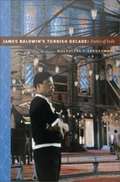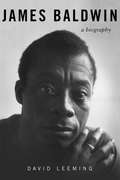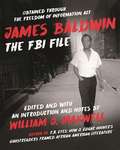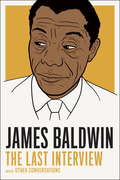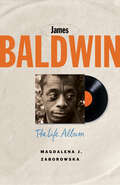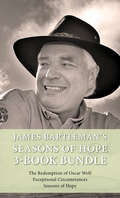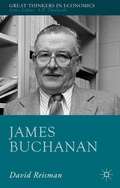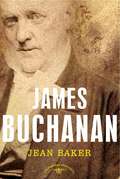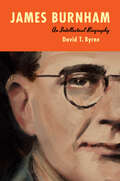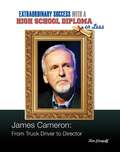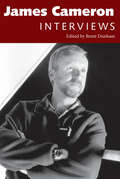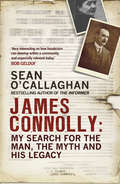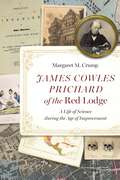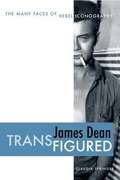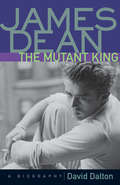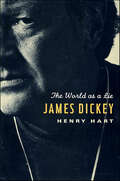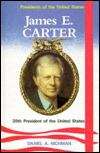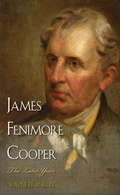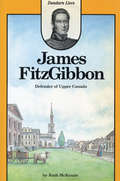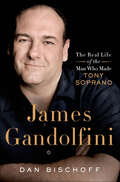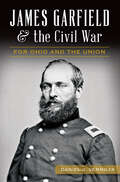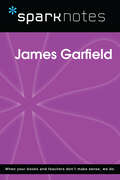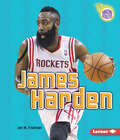- Table View
- List View
James Baldwin's Turkish Decade: Erotics of Exile
by Magdalena J. ZaborowskaBetween 1961 and 1971 James Baldwin spent extended periods of time in Turkey, where he worked on some of his most important books. In this first in-depth exploration of Baldwin's "Turkish decade," Magdalena J. Zaborowska reveals the significant role that Turkish locales, cultures, and friends played in Baldwin's life and thought. Turkey was a nurturing space for the author, who by 1961 had spent nearly ten years in France and Western Europe and failed to reestablish permanent residency in the United States. Zaborowska demonstrates how Baldwin's Turkish sojourns enabled him to re-imagine himself as a black queer writer and to revise his views of American identity and U. S. race relations as the 1960s drew to a close. Following Baldwin's footsteps through Istanbul, Ankara, and Bodrum, Zaborowska presents many never published photographs, new information from Turkish archives, and original interviews with Turkish artists and intellectuals who knew Baldwin and collaborated with him on a play that he directed in 1969. She analyzes the effect of his experiences on his novel Another Country (1962) and on two volumes of his essays, The Fire Next Time (1963) and No Name in the Street (1972), and she explains how Baldwin's time in Turkey informed his ambivalent relationship to New York, his responses to the American South, and his decision to settle in southern France. James Baldwin's Turkish Decade expands the knowledge of Baldwin's role as a transnational African American intellectual, casts new light on his later works, and suggests ways of reassessing his earlier writing in relation to ideas of exile and migration.
James Baldwin: A Biography
by David LeemingJames Baldwin was one of the great writers of the last century. In works that have become part of the American canon-Go Tell It on a Mountain, Giovanni’s Room, Another Country, The Fire Next Time, and The Evidence of Things Not Seen-he explored issues of race and racism in America, class distinction, and sexual difference. A gay, African American writer who was born in Harlem, he found the freedom to express himself living in exile in Paris. When he returned to America to cover the Civil Rights movement, he became an activist and controversial spokesman for the movement, writing books that became bestsellers and made him a celebrity, landing him on the cover of Time.In this biography, which Library Journal called "indispensable,” David Leeming creates an intimate portrait of a complex, troubled, driven, and brilliant man. He plumbs every aspect of Baldwin’s life: his relationships with the unknown and the famous, including painter Beauford Delaney, Richard Wright, Lorraine Hansberry, Marlon Brando, Harry Belafonte, Lena Horne, and childhood friend Richard Avedon; his expatriate years in France and Turkey; his gift for compassion and love; the public pressures that overwhelmed his quest for happiness, and his passionate battle for black identity, racial justice, and to "end the racial nightmare and achieve our country.”Skyhorse Publishing, along with our Arcade, Good Books, Sports Publishing, and Yucca imprints, is proud to publish a broad range of biographies, autobiographies, and memoirs. Our list includes biographies on well-known historical figures like Benjamin Franklin, Nelson Mandela, and Alexander Graham Bell, as well as villains from history, such as Heinrich Himmler, John Wayne Gacy, and O. J. Simpson. We have also published survivor stories of World War II, memoirs about overcoming adversity, first-hand tales of adventure, and much more. While not every title we publish becomes a New York Times bestseller or a national bestseller, we are committed to books on subjects that are sometimes overlooked and to authors whose work might not otherwise find a home.
James Baldwin: The FBI File
by William J. MaxwellAvailable in book form for the first time, the FBI's secret dossier on the legendary and controversial writer. Decades before Black Lives Matter returned James Baldwin to prominence, J. Edgar Hoover’s FBI considered the Harlem-born author the most powerful broker between black art and black power. Baldwin’s 1,884-page FBI file, covering the period from 1958 to 1974, was the largest compiled on any African American artist of the Civil Rights era. This collection of once-secret documents, never before published in book form, captures the FBI’s anxious tracking of Baldwin’s writings, phone conversations, and sexual habits?and Baldwin’s defiant efforts to spy back at Hoover and his G-men.James Baldwin: The FBI File reproduces over one hundred original FBI records, selected by the noted literary historian whose award-winning book, F.B. Eyes: How J. Edgar Hoover’s Ghostreaders Framed African American Literature, brought renewed attention to bureau surveillance. William J. Maxwell also provides an introduction exploring Baldwin's enduring relevance in the time of Black Lives Matter along with running commentaries that orient the reader and offer historical context, making this book a revealing look at a crucial slice of the American past?and present.
James Baldwin: The Last Interview
by James Baldwin Quincy TroupeNever before available, the unexpurgated last interview with James Baldwin"I was not born to be what someone said I was. I was not born to be defined by someone else, but by myself, and myself only." When, in the fall of 1987, the poet Quincy Troupe traveled to the south of France to interview James Baldwin, Baldwin's brother David told him to ask Baldwin about everything--Baldwin was critically ill and David knew that this might be the writer's last chance to speak at length about his life and work.The result is one of the most eloquent and revelatory interviews of Baldwin's career, a conversation that ranges widely over such topics as his childhood in Harlem, his close friendship with Miles Davis, his relationship with writers like Toni Morrison and Richard Wright, his years in France, and his ever-incisive thoughts on the history of race relations and the African-American experience.Also collected here are significant interviews from other moments in Baldwin's life, including an in-depth interview conducted by Studs Terkel shortly after the publication of Nobody Knows My Name. These interviews showcase, above all, Baldwin's fearlessness and integrity as a writer, thinker, and individual, as well as the profound struggles he faced along the way.
James Baldwin: The Life Album (Black Lives)
by Magdalena J. ZaborowskaAn intimate portrait of James Baldwin, offering a new understanding of his life and works as seen through his close relationships and private life James Baldwin (1924–1987) was a pivotal figure of the twentieth century, an influential author, intellectual, and activist who led a celebrated public life—and whose words and image and persona remain current in our culture. Baldwin&’s many incarnations—&“son of Harlem,&” &“Black icon,&” &“great twentieth-century writer,&” &“race man,&” &“prophet,&” &“witness&”—have reemerged in the digital age as Baldwin&’s work becomes a touchstone for a new generation. It is the private, vulnerable, and messier Baldwin—the man behind the prophet and the online meme—who is the focus of this book. Magdalena J. Zaborowska draws on Baldwin&’s archives and material legacy—from his unpublished papers to his books to his house in France—to offer a fresh look at the writer&’s understated and obscured private life. Taking a cue from Baldwin&’s own love of the blues, Zaborowska presents his biography as a series of tracks on a vinyl record, introducing, developing, and remixing the themes and relationships from his life. She recounts episodes from Baldwin&’s troubled childhood, his struggles with sexuality and gender, his intimate relationships, and the overlooked influence of women, Jews, and queers on his writing. This Life Album revolves around Baldwin&’s development of a unique worldview, &“Black queer humanism,&” premised on African diaspora aesthetics, resilience, joy, community, internationalism, activism, and justice.
James Bartleman's Seasons of Hope 3-Book Bundle: Seasons of Hope / Exceptional Circumstances / The Redemption of Oscar Wolf
by James BartlemanNovelist, diplomat, statesman, representative of both the First Nations and the Crown in Canada, James Bartleman always writes from his incredible personal experience. Presented here are three extraordinary books, each touching on a different aspect of his life, whether a candid tell-all about the halls of power, or his unique novels in which the names and details have been changed to protect the innocent. Guaranteed to captivate readers of all stripes. Includes: Seasons of Hope Traces James Bartleman's life from an impoverished Native childhood to being appointed ambassador for Canada and lieutenant governor for Ontario, and how as his career advanced, he mobilized public support for Native education. This story traces the whole amazing story. Exceptional Circumstances When Luc Cadotte, diplomat and spy, returns home from Latin America during the FLQ Crisis, he becomes entangled in political machinations and a story of espionage, betrayal, and love gone wrong. Facing an unprecedented wave of domestic terrorism, Cadotte must weigh his ethics against public safety, with lives on the line. The Redemption of Oscar Wolf A saga of mid-20th-century Native life in Canada and abroad, and a novel of resonating ideas and unforgettable characters, whose fascinating, anti-hero protagonist sets out on a quest for redemption after a terrible incident kills his grandfather and a young maid.
James Buchanan
by David ReismanJames Buchanan (1919-2013) was awarded the Nobel Prize in Economics in 1986 for his synthesis of market economics and political democracy. A libertarian, a contractarian, a constitutionalist, Buchanan saw the social world as a network of individuals revealing preferences and negotiating exchanges. Self-interest that might otherwise have led to the war of each against all is channelled into the division of labour and capitalism by consent. Trade gives rational individuals the opportunity to increase each other's felt well-being. Gain-seeking anarchy is the economist's utopia but still a protective State is needed to ensure that agreements are honoured and the rules obeyed. Buchanan made himself a missionary for binding agreements and good rules. Without them, he warned, we would surely fight. Using morals when other economists used mathematics, Buchanan argued a market economist's case for tolerance of diversity, unanimity of consensus and uncompromising respect. This book, James Buchanan, seeks to explain and evaluate the thought-provoking insights of a prolific and original thinker who enriched the ethical aspirations of a frequently dismal science.
James Buchanan (The American Presidents Series)
by Jean H. Baker Arthur M. Schlesinger Jr.Almost no president was as well trained and well prepared for the office as James Buchanan. He had served in the Pennsylvania state legislature, the U.S. House, and the U.S. Senate; he was Secretary of State and was even offered a seat on the Supreme Court. And yet, by every measure except his own, James Buchanan was a miserable failure as president, leaving office in disgrace. Virtually all of his intentions were thwarted by his own inability to compromise: he had been unable to resolve issues of slavery, caused his party to split-thereby ensuring the election of the first Republican president, Abraham Lincoln--and made the Civil War all but inevitable. Historian Jean H. Baker explains that we have rightly placed Buchanan at the end of the presidential rankings, but his poor presidency should not be an excuse to forget him. To study Buchanan is to consider the implications of weak leadership in a time of national crisis. Elegantly written, Baker's volume offers a balanced look at a crucial moment in our nation's history and explores a man who, when given the opportunity, failed to rise to the challenge.
James Buchanan: Fifteenth President Of The United States
by David R. CollinsPresents the life of James Buchanan, including his childhood, education, employment, and political career.
James Burnham: An Intellectual Biography
by David T. ByrneIn this intellectual biography of one of the most important political thinkers of the twentieth century, David T. Byrne reveals the fascinating life of James Burnham. Beginning his intellectual career as a disciple of Leon Trotsky, Burnham preached socialist revolution to the American working classes during the Great Depression. In 1940 he split with Trotsky over the nature of the USSR. Attempting to explain the world that was emerging in the early days of World War II, Burnham penned one of the most successful political works of the early 1940s, titled The Managerial Revolution. This dystopian treatise predicted collectivization and rule by bland managers and bureaucrats. Burnham's next book, The Machiavellians, argued that political elites seek only to obtain and maintain power, and democracy is best achieved by resisting them.After World War II, Burnham became one of the foremost anticommunists in the United States. His The Struggle for the World and The Coming Defeat of Communism remain two of the most important books of the early Cold War era. Rejecting George F. Kennan's policy of containment, Burnham demanded an aggressive foreign policy against the Soviet Union. Along with William F. Buckley, Burnham helped found National Review magazine in 1955, where he expressed his political views for more than two decades.As Byrne shows in James Burnham, the political theorist's influence has stretched from George Orwell to Ronald Reagan to Donald Trump's base. Burnham's ideas about the elite and power remain part of US political discourse and, perhaps, have more relevance than ever before.
James Cameron: From Truck Driver to Director (Extraordinary Success with a High School)
by Kim EtingoffIn the last few decades, more and more people are going to college to further their education. It's hard to become a scientist, a professor, or a businessperson without getting some sort of college degree--but college isn't always necessary to achieve success. Some people are ready to enter the workforce right after high school. James Cameron was one of these people. The successful director has created some of Hollywood's biggest hits. From "Aliens" to "Avatar", from "Terminator" to "Titantic", Cameron has been making dreams--and nightmares--come to life on screen for decades. And what's most amazing about his story is that the famous filmmaker did it all without a college degree!
James Cameron: Interviews (Conversations with Filmmakers Series)
by Brent DunhamJames Cameron (b. 1954) is lauded as one of the most successful and innovative filmmakers of the last thirty years. His films often break records, both in their massive budgets and in their box-office earnings. They include such hits as The Terminator, Aliens, The Abyss, Titanic, and Avatar. Part scientist, part dramatist, Cameron combines these two qualities into inventive and captivating films that often push the boundaries of special effects to accommodate his imagination. James Cameron: Interviews chronicles the writer-director's rise through the Hollywood system, highlighted by his “can-do” attitude and his insatiable drive to make the best film possible. As a young boy growing up in Canada, Cameron imagined himself an astronaut, a deep-sea explorer, a science fiction writer, or a filmmaker. Transplanted to southern California, he would go on to realize many of those boyhood fantasies. This collection of interviews provides glimpses of the filmmaker as he advances from Roger Corman's underling to “king of the world.” The interviews are drawn from a number of sources including TV appearances and conversations on blogs, which have never been published in print. Spanning more than twenty years, this collection constructs a concise and thorough examination of Cameron, a filmmaker who has almost single-handedly ushered Hollywood into the twenty-first century.
James Connolly: My Search for the Man, the Myth and his Legacy
by Sean O'CallaghanFROM THE FORMER IRA MEMBER AND AUTHOR OF THE INFORMER, SEAN O'CALLAGHAN'Very interesting on how fanaticism can develop within a community, and especially relevant today.' Bob GeldofThe story of revolutionary James Connolly, his role in the 1916 Easter Rising, and his subsequent influence both on O'Callaghan himself, and on 20th century Irish politics.Easter Monday, 24th April, 1916: James Connolly, a 48-year-old Edinburgh-born Marxist and former British soldier, stands at the top of the steps of Liberty Hall, Dublin. 'We are going out to be slaughtered,' Connolly told his comrades, and with this he set in train the Easter Rising of 1916.Two weeks later, in a scene that has haunted Nationalist Ireland ever since, he was carried to his place of execution having been badly wounded. Placed on a chair, he was shot dead by soldiers of the army he had once served in.This is not a traditional biography; it is a book about Sean O'Callaghan's relationship with a man who was to deeply influence his formative years; it is about the politics of violent extremism that O'Callaghan subsequently became caught up in; and it's about the kind of individuals who are willing to sacrifice everything, including their lives, for a holy cause.Never has a book been more timely.
James Cowles Prichard of the Red Lodge: A Life of Science during the Age of Improvement (Critical Studies in the History of Anthropology)
by Margaret M. CrumpMargaret M. Crump offers the first thorough biography of British scientist and physician James Cowles Prichard (1786–1848), an intellectual giant in the developing human sciences, a pioneering psychiatric theorist, and Europe&’s leading anthropologist during the first half of the nineteenth century.
James Dean Transfigured: The Many Faces of Rebel Iconography
by Claudia SpringerAfter the death of James Dean in 1955, the figure of the teen rebel permeated the globe, and its presence is still felt in the twenty-first century. Rebel iconography--which does not have to resemble James Dean himself, but merely incorporates his disaffected attitude--has become an advertising mainstay used to sell an array of merchandise and messages. Despite being overused in advertisements, it still has the power to surprise when used by authors and filmmakers in innovative and provocative ways. The rebel figure has mass appeal precisely because of its ambiguities; it can mean anything to anyone. The global appropriation of rebel iconography has invested it with fresh meanings. Author Claudia Springer succeeds here in analyzing both ends of the spectrum--the rebel icon as a tool in upholding capitalism's cycle of consumption, and as a challenge to that cycle and its accompanying beliefs. In this groundbreaking study of rebel iconography in international popular culture, Springer studies a variety of texts from the United States and abroad that use this imagery in contrasting and thought-provoking ways. Using a cultural studies approach, she analyzes films, fiction, poems, Web sites, and advertisements to determine the extent to which the icon's adaptations have been effective as a response to the actual social problems affecting contemporary adolescents around the world.
James Dean: A Biography
by David DaltonThis is the book that restarted the James Dean cult by celebrating him as the cool, defiant visionary of pop culture who made adolescence seem heroic instead of awkward and who defined the style of rock 'n' roll's politics of delinquency. The only book to fully show how deliberately and carefully Dean crafted his own image and performances, and the product of still unequalled research, vivid writing, intimate photographs, and profound meditation, James Dean: The Mutant King has become almost as legendary as its subject.
James Dickey: The World as a Lie
by Henry HartA fascinating biography of one of the most popular, colorful, and notorious American poets of our century.The legendary Southern poet James Dickey never shied away from cultivating a heroic mystique. Like Norman Mailer and Ernest Hemingway, he earned a reputation as a sportsman, boozer, war hero, and womanizer as well as a great poet, novelist, screenwriter, and essayist. But James Dickey made lying both a literary strategy and a protective camouflage; even his family and closest friends failed to distinguish between the mythical James Dickey and the actual man. Henry Hart sees lying as the central theme to Dickey's life; and in this authoritative, immensely entertaining biography he delves deep behind Dickey's many masks. Letters, anecdotes, tall tales and true ones, as well as the reluctant but finally candid cooperation of Dickey himself animate Hart's narration of a remarkable life. Readers of Dickey's National Book Award-winning poetry, his bestselling novel Deliverance, and anyone who witnessed his electrifying readings of his work will savor this book.
James Douglas: Father of British Columbia
by Julie H. FergusonJames Douglas’s story is one of high adventure in pre-Confederation Canada. It weaves through the heart of Canadian and Pacific Northwest history when British Columbia was a wild land, Vancouver didn’t exist, and Victoria was a muddy village. Part black and illegitimate, Douglas was born in British Guiana (now Guyana) in 1803 to a Scottish plantation owner and a mixed-race woman. After schooling in Scotland, the fifteen-year-old Douglas sailed to Canada in 1819 to join the fur trade. With roads non-existent, he travelled thousands of miles each year, using the rivers and lakes as his highways. He paddled canoes, drove dogsleds, and snowshoed to his destinations. Douglas became a hard-nosed fur trader, married a part-Cree wife, and nearly provoked a war between Britain and the United States over the San Juan Islands on the West Coast. When he was in his prime, he established Victoria and secrured the western region of British North America from the Russian Empire and the expansionist Americans. Eventually, Douglas became the controversial governor of the Colonies of Vancouver Island and British Columbia and oversaw the frenzied Fraser and Cariboo gold rushes.
James E. Carter: 39th President Of The United States
by Richard G. Young Daniel A. RichmanFollows the life of Jimmy Carter, including his childhood, education, employment, political career, and term of presidency.
James Fenimore Cooper: The Later Years
by Wayne FranklinA definitive new biography of James Fenimore Cooper, early nineteenth century master of American popular fiction American author James Fenimore Cooper (1789–1851) has been credited with inventing and popularizing a wide variety of genre fiction, including the Western, the spy novel, the high seas adventure tale, and the Revolutionary War romance. America’s first crusading novelist, Cooper reminds us that literature is not a cloistered art; rather, it ought to be intimately engaged with the world. In this second volume of his definitive biography, Wayne Franklin concentrates on the latter half of Cooper’s life, detailing a period of personal and political controversy, far-ranging international travel, and prolific literary creation. We hear of Cooper’s progressive views on race and slavery, his doubts about American expansionism, and his concern about the future prospects of the American Republic, while observing how his groundbreaking career management paved the way for later novelists to make a living through their writing. Franklin offers readers the most comprehensive portrait to date of this underappreciated American literary icon.
James FitzGibbon: Defender of Upper Canada
by Ruth McKenzieJames FitzGibbon, Defender of Upper Canada, is the often poignant story of a poor man’s rise to authority in the Upper Canada of the 1800s. Born the son of a tenant farmer in Ireland, FitzGibbon’s valour as a soldier brought him to the attention of those destined for power in the Canadas. Hero of the Battle of Beaver Dams in 1813, one o the decisive battles in the War of 1812, FitzGibbon’s brilliance as tactician and negotiator was needed time and again — whether to settle Irish unrest on the Cornwall Canal, or to organize Toronto’s defence against William Lyon Mackenzie’s rebel forces in 1837. As a public administrator, FitzGibbon’s rise was slow and disappointing. Despite holding a multitude of offices, he was continually in debt. And despite repeated petitions, FitzGibbon’s tireless military and public services went unrecognized and unrewarded. His final reward as a ceremonial knight in Windsor Castle adds a tragicomic touch to a fascinating tale.
James Gandolfini: The Real Life of the Man Who Made Tony Soprano
by Dan BischoffJames Gandolfini: The Real Life of the Man Who Made Tony Soprano is the first biography of the actor who died, in June 2013 at age 51, widely recognized as one of the best—and most defining—actors of his generation. The book is informed by fresh interviews with Sopranos actors, the star's acting teachers and coaches, his childhood friends, buddies from his days as a nightclub bouncer, and Hollywood figures including the directors of his posthumously released films. Bischoff decodes Gandolfini's portrayal of mobsters and bad guys from his breakout role in True Romance with Patricia Arquette to the television series role that made his career, and his portrayals of real people like Leon Panetta in Zero Dark Thirty. Gandolfini's personal life--from his marriages and family interactions to his deep friendships with his fellow cast members—enriches and enlivens this book, and deepens our understanding of the star.James Gandolfini: The Real Life of the Man Who Made Tony Soprano is a fascinating look at Gandolfini's complicated relationship to his roots, to the role that made him wealthy beyond his imagination, and to American notions of masculinity, power and fame. Even as he scaled the heights of his profession, creating a TV character as vivid as Carroll O'Connor's Archie Bunker and as volcanic as Marlon Brando's Stanley Kowalski, Gandolfini remained a reluctant celebrity dedicated more to his craft than to his career. James Gandolfini: The Real Life of the Man Who Made Tony Soprano delivers a textured, multilayered portrait of the on- and off-screen life of a complex, talented man who rose from an Italian immigrant family in northern New Jersey to join the ranks of America's most iconic actors.
James Garfield & the Civil War: For Ohio and the Union
by Daniel J VermilyaThis biography of America&’s twentieth president sheds light on his Civil War years, when he served as a major general for the Union Army. While his presidency was tragically cut short by his assassination, James Abraham Garfield's eventful life covered some of the most consequential years of American history. When the United States was divided by war, Garfield was one of many who stepped forward to defend the Union. In this biography, historian Daniel J. Vermilya reveals the little-known story of Garfield's role in the Civil War. From humble beginnings in Ohio, Garfield rose to become a major general in the Union army. His military career took him to the backwoods of Kentucky, the fields of Shiloh and Chickamauga, and ultimately to the halls of Congress. His service during the war established Garfield as a courageous leader who would one day lead the country as president.
James Garfield (SparkNotes Biography Guide)
by SparkNotesJames Garfield (SparkNotes Biography Guide) Making the reading experience fun! SparkNotes Biography Guides examine the lives of historical luminaries, from Alexander the Great to Virginia Woolf. Each biography guide includes:An examination of the historical context in which the person lived A summary of the person&’s life and achievements A glossary of important terms, people, and events An in-depth look at the key epochs in the person&’s career Study questions and essay topics A review test Suggestions for further reading Whether you&’re a student of history or just a student cramming for a history exam, SparkNotes Biography guides are a reliable, thorough, and readable resource.
James Harden (Amazing Athletes Ser.)
by Jon M. FishmanHouston Rockets guard James Harden lit up scoreboards to the tune of more than 25 points per game in 2014-2015. That made him one of the best scorers in the league. But he wasn't always such a star player. When James played for the Oklahoma City Thunder from 2009 to 2012, he started only seven games. After signing on with Houston for the 2012-2013 NBA season, James exploded as one of the top players in the NBA. Read all about James's journey from his birthplace in Los Angeles to NBA stardom in Houston.
